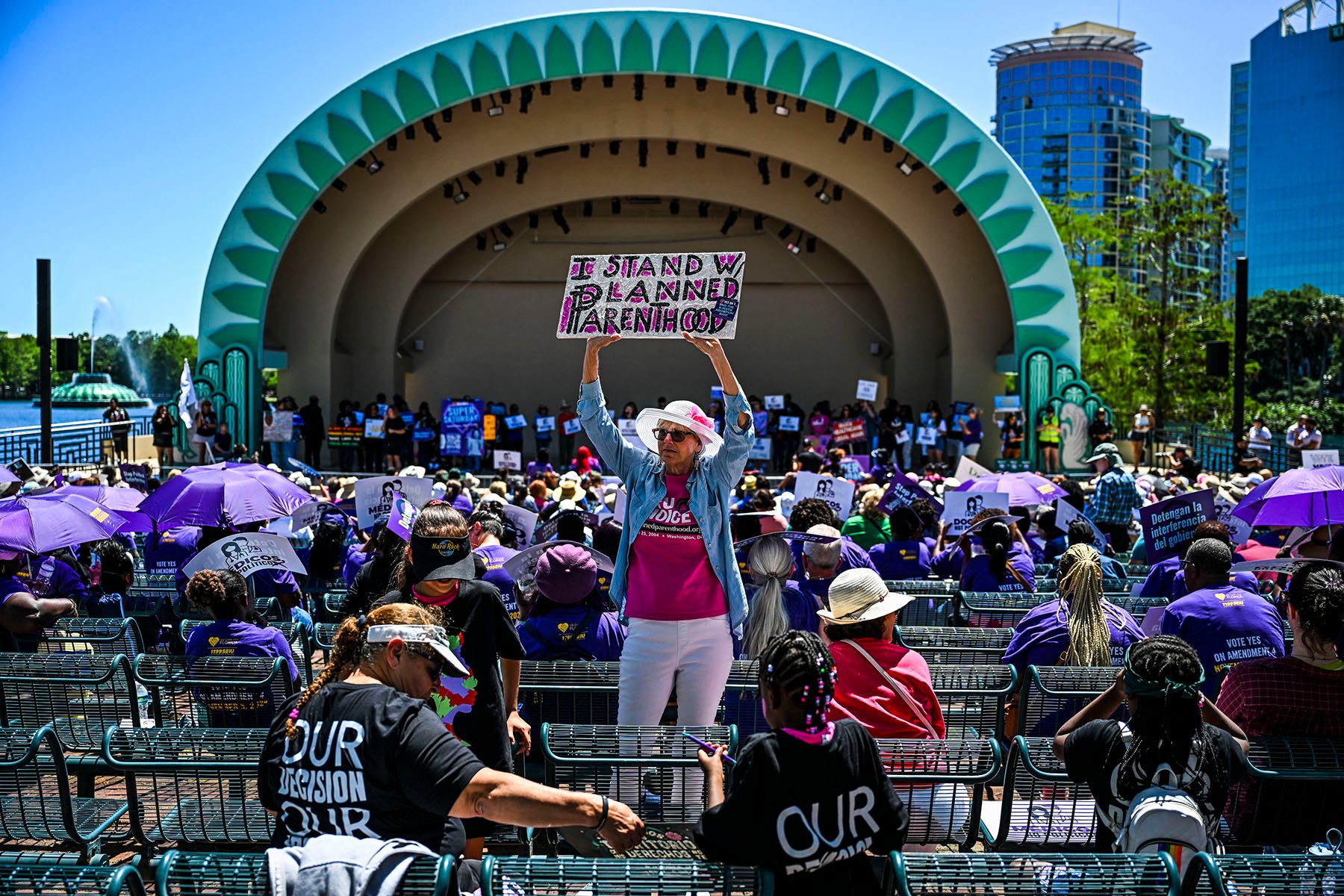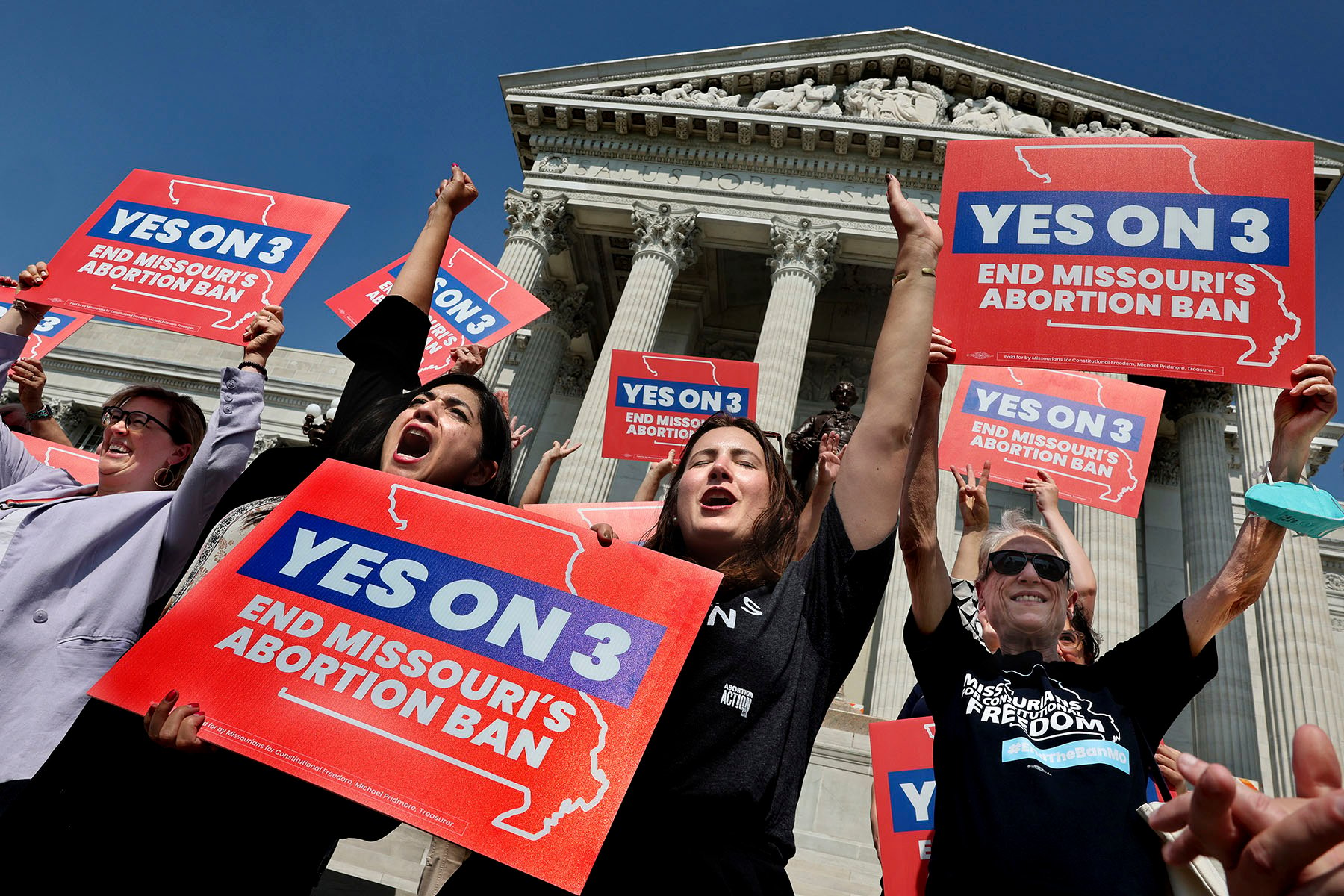Your trusted source for contextualizing abortion and Election 2024 news. Sign up for our daily newsletter.
In Missouri and Nebraska, abortion opponents unsuccessfully attempted to run out the clock with last-minute court challenges to keep voters from weighing in on abortion ballot measures. A court challenge in South Dakota threatens to invalidate an abortion rights amendment well after voting gets underway. In Florida, advocates are suing a state agency they accuse of using taxpayer funds to spread false and misleading claims about a proposed abortion rights constitutional amendment.
For months, Republican elected officials and anti-abortion advocates have attempted to stop abortion from getting on the ballot in the first place. Their efforts failed in all but one state, Arkansas. And now, as the first ballots of the 2024 election are being printed and readied to go out to voters, advocates are contending with costly, last-ditch legal fights and state-backed campaigns to derail their efforts.
The Missouri Supreme Court this week shut down an 11th-hour effort by a Republican state lawmaker to derail a measure that would restore a right to abortion and other forms of reproductive health care in Missouri, which has a near-total abortion ban in place.
On Saturday, a local judge ruled to invalidate the measure on the grounds that it did not state which specific laws it would overturn. Missourians for Constitutional Freedom, the coalition backing the measure, appealed, expediting the case to the state Supreme Court on Tuesday — the deadline for election officials to print mail ballots.
The state’s chief election official, Jay Ashcroft, a Republican candidate for governor who has used his office to oppose the abortion rights amendment, “decertified” it and took it off the secretary of state’s website before the Supreme Court could make a ruling.
Attorney Chuck Hatfield of Stinson LLP, representing Missourians for Constitutional Freedom, described Ashcroft’s actions as “shenanigans” in oral arguments before the court.
“It’s open contempt for your authority. It’s open contempt for the rule of law, it’s open contempt for the proper administration of justice to tell the public that he’s going to take it off the ballot, even though we’re here this morning having this discussion,” he told the justices.
Hours later, the high court ruled in the group’s favor, ordering Ashcroft to “take all steps necessary” to ensure the measure appears on the ballot. Rachel Sweet, the campaign manager for Missourians for Constitutional Freedom, called the ruling a “victory for both direct democracy and reproductive freedom.”
“This fight was not just about this amendment — it was about defending the integrity of the initiative petition process and ensuring that Missourians can shape their future directly,” she said in a statement.
Republicans, including former President Donald Trump, have argued that the Supreme Court’s decision in Dobbs v. Jackson Women’s Health Organization rightfully returned abortion policy to state legislatures and voters. But in the states, Republicans have only intensified long-standing efforts to undercut comes to abortion rights measures. direct democracy initiatives that would restore a right to abortion.
In Florida, where abortion is banned after six weeks, the group Floridians Protecting Freedom submitted over 1 million signatures and got the sign-off from the state’s highest court in February on language for an abortion rights measure, certified for the ballot as Amendment 4.
But the administration of Gov. Ron DeSantis, who signed the six-week ban into law, is using multiple levers of government to tip the scales against the amendment and cast doubt on its validity. A recent poll from Emerson College/The Hill showed 55 percent of likely Florida voters supported the measure; it requires at least 60 percent of the vote to pass.
On Thursday, the ACLU of Florida and Southern Legal Counsel filed suit against the Florida Agency for Healthcare Administration (AHCA), which they say “has crossed a dangerous line by using public resources to mislead voters and manipulate their choices” with a taxpayer-funded marketing campaign opposing the amendment. It echoes a similar website made by state officials in Ohio, which voted to guarantee an abortion rights measure in 2023.
The Florida campaign includes a television ad and a landing page on its website claiming that the amendment “threatens women’s safety” and states: “we must keep Florida from becoming an abortion tourism destination state.” In a statement to the Florida Times-Union, the AHCA defended the website as an effort to educate voters and provide “transparency” as to what the amendment would do.
“This website has been filled with demonstrably false statements and so we’re challenging the misuse of taxpayer dollars to lie to voters about this amendment,” Michelle Morton, staff attorney for the ACLU of Florida, said on a Wednesday call with reporters. “This is not what government is supposed to be, it’s not what government is supposed to do.”

In another unusual move, the Florida Department of State has directed several county election supervisors to review some 36,000 signatures out of the almost one million that were verified in February as part of a probe into unspecified claims of petition fraud. Some voters who signed petitions have been unsettled by law enforcement officers showing up to their homes to inquire about their signatures, the Miami Herald reported.
It’s unclear what the investigation’s endgame is. Proponents of Amendment 4 slammed the effort as nothing more than a distraction meant to intimidate voters and deflect attention away from the consequences of the ban.
“When you don’t want to talk about an abortion ban that has no real exceptions and that is criminally harming women, you talk about distractions,” Lauren Brenzel, campaign director for the Yes on 4 campaign, said on the call.
Court challenges threatened to forestall abortion ballot measures in two Great Plains states.
In Nebraska, the state Supreme Court on Monday heard arguments in three cases regarding two competing abortion ballot measures set to go before voters, days before Friday’s deadline for the secretary of state to certify them for the ballot.
Two cases, including one brought by the conservative Thomas More Society, argued a measure to restore abortion rights to the point of fetal viability violated a legal requirement for ballot measures to cover a single subject.
Protect Our Rights, the group supporting the amendment, in a statement posted to their Facebook page called the cases “distractions funded and driven by anti-abortion politicians who are doing everything in their power to undermine the process and lay the groundwork for their ultimate goal: a total abortion ban.”
On Friday, the court ruled that both the pro and anti-abortion measures will appear on the ballot.
And in South Dakota, which has a near-total abortion ban in place, arguments are set to begin September 23 in a lawsuit challenging the validity of a proposed constitutional amendment, Amendment G, that would restore legal abortion access under the framework set by Roe v. Wade.
The measure, backed by the group Dakotans for Health, has already been certified and will remain on the ballot. But if the legal case against it succeeds, the votes for it will be invalidated and it will not go into effect. Dakotans for Health lambasted the lawsuit, brought by the anti-abortion Life Defense Fund, as a “legal charade” and a “show trial” that constitutes a “flagrant misuse” of the state’s legal system and taxpayer funds.
Brenzel, for her part, is keeping her efforts and messaging focused on the women and patients affected by the state’s ban.
“We’re not focused on uncredible allegations. We’re focused on a ban that is criminal and that it forced women to give birth to children who have died in their arms,” she said. “It forced women to lose half of the blood in their body before they were able to access care. It has denied women access to medically necessary care, and that’s what’s criminal.”





